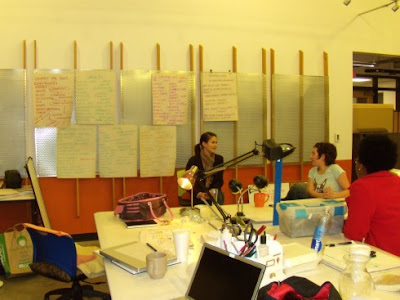here are a few of the lecture topics:
-minimal processing
-natural, locally produced materials
-fewer parts
-durability
-human rights
-and a designer's mantra that goes something like "justify the embodied costs of your design and return opportunity and benefits to the community"
leonetti referenced history throughout the lecture, beginning with the notion that we've been fearful of the world for a long time... and that this fear drives us to create walled cities removed from the natural environment where we can all exist in "comfort". as environmental, human rights and slow food activists question issues surrounding ethics, acquisition, and control; leonetti encouraged us as designers to take part in this dialogue stating "after all, we contribute to the stuff in the world". after the lecture, leonetti gave us the parameters for a 22 hour charette (intense design session), which challenged 4 student groups to develop a product or space that would fall in line with the slow green design movement and address ideas of local identity and international discourse.
after many hours of brainstorming, sketching and debating, my team members (laura snoderly, nacarra lassane, katie reynolds, maiken schoenleber) and i designed what we like to call "story jar". based on storytelling as a method of cultural preservation, story jar is an artistic, interactive traveling installation consisting of a free standing shelf lined with mason jars containing audio clips and personal items. participants are encouraged to open the jars and listen. it's intended to be an intimate, tactile experience as a jar is cupped to an ear and a uniquely southern experience is shared. we chose the mason jar because it translates well as a universally understood object that is overwhelmingly associated with the american south. the installation aims to explore issues surrounding southern separatism, isolation, preservation, survival, tradition and identity. simplistic in materiality, relevant to slow green design, feasible and communicative in design, story jar was selected as the winner of the charette.
it seems that by supporting the density of humanity, we truly have become the victims of our own weight-- the weight of progress in an exploited world. as designers, we have the potential to change the world, and with this comes a responsibility to examine the repercussions of our designs through a holistic
lens. after leonetti's charette, i keep asking myself what is the true nature of progress, and why is it that an increased standard of living can result in a decreased quality of life?




No comments:
Post a Comment